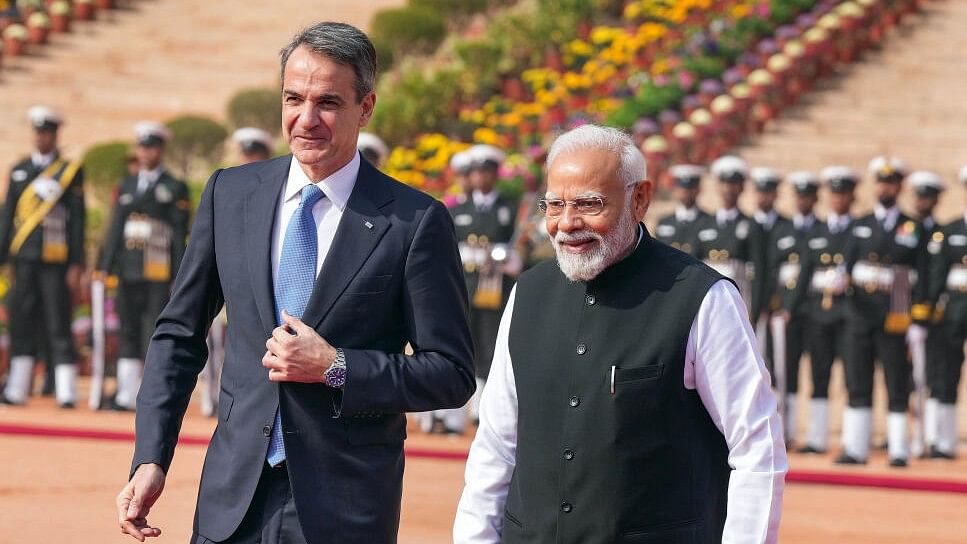
Prime Minister Narendra Modi with Prime Minister of Greece Kyriakos Mitsotakis.
Credit: PTI Photo
Amidst the warm welcome extended by New Delhi to Greek Prime Minister Kyriakos Mitsotakis on February 21, experts are lauding this diplomatic overture as a pivotal step towards establishing a strategic partnership that goes beyond the confines of the European Union (EU). The discussions revolving around the India-Middle East-Europe Economic Corridor (IMEC) are widely seen as a groundbreaking development, positioning India as a key entry point into Asia for Greece in this transformative initiative.
Despite the promising alliance indicated by the reception and ensuing dialogues between the two countries, it is essential to recognise that characterising India solely as a pathway for Greece oversimplifies recent developments. Concurrently, Greece has maintained close ties with China, benefiting from their evolving relationship over the past few decades. This was reiterated during Mitsotakis visit to Beijing in November, adding a nuanced dimension to Athens’ engagement in the Asian theatre.
Historically, Greece has stood by China at times when its European counterparts have chosen to criticise the Asian giant. In July 2016, after the Permanent Court of Arbitration (PCA) dismissed China’s claims over the South China Sea, the EU failed to adopt a common statement on Beijing’s legal defeat at the PCA as the statement was blocked by Athens. Similarly, in June 2017, Greece blocked an EU statement at the United Nations Human Rights Council (UNHRC) criticising human rights abuses in China, marking the first time the EU refrained from issuing such a statement at the UNHRC.
Greece, singularly blocking EU statements on China initiated after the European country sold majority stakes of the Piraeus port to Chinese shipping company COSCO in April 2016. In 2018, Greece also became the first EU country to become a part of the Belt and Road Initiative (BRI) with the Piraeus port playing a crucial role in connecting Europe to Asia, as part of BRI. Thus, Greece’s commitment to China due to its investment in Piraeus port is massive, which is not only limited to connectivity but also to providing political support across international forums.
At a time when China-EU relations are at a crossroads, Greece continues to present an opportunity. During the Greek Prime Minister's visit to China in November, a resonating statement emphasised across media was that the friendship between China and Greece transcends conventional partnerships between nations; it encompasses a profound dialogue between ‘civilisations’.
A significant focus was placed on promoting high-quality BRI co-operation and ensuring the long-term, stable, and sustainable development of the Piraeus port. Over the past decade, the successful development and operation of the port has positioned Greece as a crucial gateway for China connecting land and sea, linking Europe to Asia, thereby, strengthening and expanding the co-operation between the two nations.
Thus, India, clearly, is not Greece’s gateway to Asia. The European nation has ensured quite a robust connectivity route to Asia via China. Moreover, while for connectivity purposes, India and Greece recently discussed that direct flights should be established by encouraging the private sector, flight connectivity between Athens and Beijing has been operational since 2017, and it will be further increased from April 1.
Despite the close co-operation between Athens and Beijing, Mitsotakis said that China doesn’t feature prominently as an investor in Greece, apart from the notable investment made towards the Piraeus port. Additionally, last month, during Mitsotakis visit to India, at the Raisina Dialogue, he emphasised the importance of advancing IMEC and how partners should continue with it despite the ongoing conflict in Gaza.
Access to the Piraeus port is crucial for ensuring the fulfilment of the IMEC, but with the port under Chinese ownership, a massive roadblock stands in the way. During a special briefing of the Ministry of External Affairs, Foreign Secretary Vinay Kwatra said that no particular ports were discussed as part of the IMEC discussions between Prime Minister Narendra Modi and Mitsotakis, hinting at the China hurdle.
Given the Piraeus port is crucial to both, the BRI and the IMEC, the pertinent question that needs answering is where will Greece place its bets? Currently, Greece seems to be employing strategic hedging against both New Delhi and Beijing, which no doubt helps it get the best of both worlds in Asia; but, at the same time, it presents a humongous task for the Indian administration to not find a fully committed partner in Greece.
Having faith in India’s diplomatic prowess which has provided several wins for New Delhi in the past few years, there is a long road ahead, witnessing several negotiations to connect Greece as part of the IMEC, if not through the Piraeus port, then maybe through an alternative port.
(Arkoprabho Hazra (X: @ArkoprabhoH) is manager, and Swapneel Thakur is senior manager, Aakhya India.)
Disclaimer: The views expressed above are the author's own. They do not necessarily reflect the views of DH.